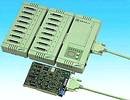Multiserial communication controller
September 2002
PLCs, DCSs & Controllers

The PCL-747+ from Advantech, is an expandable intelligent multiserial communication controller available in 8, 16, 24 and 32-port configurations. With its 40 MHz RISC processor, 512 KB of RAM, and a suite of software drivers/tools for Advantech's multiport boards, the intelligent PCL-747+ acts as a front end I/O processor, relieving the workload of the host computer.
Four PCL-747+ multiport controllers can be installed in a single host computer, providing up to 128 serial communication channels. The PCL-747+ complies with ISA specifications.
The control board resides in the host computer with an on-board RISC processor managing I/O traffic. The control board and external multiport modules communicate with each other via a high speed RS422 synchronous interface over a standard 2 m cable.
The CPU module also has its own RISC processor that works with the control board to reduce host CPU overhead. This double CPU architecture can raise performance to the highest degree. The CPU module features power-on and self-test LEDs that allow the user to monitor individual port activity for easy diagnostics.
To improve overall performance, each UART module is equipped with an efficient serial communication controller that allows transfer rates of 460,8 Kbps per port. The UART module is available with an RS232 or an RS422 interface and male or female DB-25 connectors.
For optimum system performance, an intelligent board needs smart firmware. This relieves the host CPU of all device interrupt handling, performs 'cooked' data processing and handles all hardware and software flow control. The PCL-747+ supports all popular operating systems such as Windows 3.x, Windows 95/98, Wiindows NT/2000, Linux and DOS, Advantech is represented locally by ProMicro.
For more information contact, Elton Prytz, ProMicro, 011 706 7913, [email protected], www.promicro.co.za
Further reading:
ABB technology for greater circularity in metals and mining industries
PLCs, DCSs & Controllers
ABB has been selected by GreenIron, an innovative Swedish company working in the mining and metals industries with its patented materials reduction technology, to provide automation and control system solutions for a first commercial facility in Sandviken, Sweden.
Read more...
EtherCAT Box modules for confined spaces
Beckhoff Automation
PLCs, DCSs & Controllers
Users of EtherCAT and EtherCAT P Box modules from Beckhoff’s EP and EPP series benefit from 25 years of IP67 expertise in the I/O sector. The broad product range for decentralised distribution of the I/O level directly at the machine or system has been continuously expanded and further developed during this time.
Read more...
ABB updates distributed control system
ABB South Africa
PLCs, DCSs & Controllers
Leveraging 30 years of continuous innovation and reliability, ABB’s updated Freelance 2024 distributed control system (DCS) offers greater plant adaptability, faster and more reliable device communication, improved system security, and seamless data exchange.
Read more...
Four ways modern operations control can boost sustainability and efficiency
PLCs, DCSs & Controllers
With the growing importance of digital transformation, HMIs and scada have evolved from control panels to vast operational hubs. Next-gen HMI/scada can bring together data, personalisation, and advanced insights to successfully achieve organisational goals, it is important to think about HMI/scada holistically within the operations ecosystem.
Read more...
The convergence of intelligence: DCS, SCADA and TLC
Schneider Electric South Africa
PLCs, DCSs & Controllers
In the early days of industrialisation, control systems were primarily mechanical, and relied on manual intervention and simple feedback loops to manage processes. Now, in the 21st century, industrial process automation systems are mind-blowingly intelligent, and provide almost unparalleled control and monitoring capabilities, making them integral to modern industrial systems.
Read more...
PC-based control for advanced hydrogen storage technology
Beckhoff Automation
Editor's Choice PLCs, DCSs & Controllers
The proportion of renewable energies from solar, wind and water is rising continuously. However, sufficient storage options are of the essence to use these energies as efficiently as possible. GKN Hydrogen offers a particularly compact and safe option, low-pressure metal hydride hydrogen storage systems with PC-based control from Beckhoff.
Read more...
ABB modernises key board mill
ABB South Africa
PLCs, DCSs & Controllers
ABB has secured a landmark contract to modernise Smurfit Kappa’s Paper Machine 5 at its corrugated cardboard mill near Mexico City. ABB will provide Smurfit Kappa with DCS, accompanied by a comprehensive paper machine drives system, encompassing some of the market’s most advanced drives and motors meticulously designed to optimise PM5’s performance.
Read more...
The synapses of the distributed control system
Schneider Electric South Africa
PLCs, DCSs & Controllers
Industrial operations require a distributed control system (DCS) to coordinate and control their process subsystems in real time. Like the brain, a DCS is a multitasking maestro, controlling and coordinating complex processes in a myriad of industrial setting such as large manufacturing plants, providing valuable top-down control.
Read more...
Modular assembly platform for clean manufacturing
Beckhoff Automation
PLCs, DCSs & Controllers
JR Automation delivers custom automated solutions for numerous industries. It has done this through its scalable, modular automation platform, FlexChassis, which speeds up time to market while cutting costs. The company chose the XTS linear transport system from Beckhoff because of its speed, and modular design that allows for multiple configurations.
Read more...
Selecting the best remote access solution for your application
PLCs, DCSs & Controllers
In today’s Internet of Things (IoT) world, remote mobile access is a necessity for many industrial applications. There are several ways of implementing this connectivity with routers and virtual private networks.
Read more...

